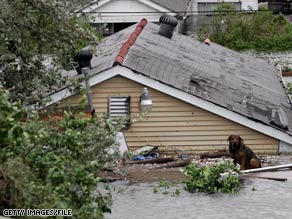(CNN) -- The Atlantic hurricane season starts Sunday, and government forecasters are predicting an above-normal season, with as many as five major hurricanes. The eastern Pacific's first tropical storm of the year formed Thursday off Central America.

Three years after Hurricane Katrina, a poll indicates many coastal dwellers don't take a hurricane threat seriously.
So are people living in hurricane-prone areas prepared?
According to a new poll, the answer is a resounding "no."
The survey, conducted by the polling firm Mason-Dixon, found that 50 percent of the 1,100 adults surveyed in Atlantic and Gulf Coast states did not have disaster plans or survival kits.
"Nearly one in three said they would not prepare their home until a storm is within 24 hours of landfall," Bill Read, director of the National Hurricane Center, said Thursday.
"If you wait until a day, day and a half before the storm gets there, long lines are at the stores, and by and large your supplies of window coverings, food and water run out, maybe before you have a chance to buy them. So now is the time to buy all that stuff," he said. ![]() Watch how one Florida homeowner is preparing »
Watch how one Florida homeowner is preparing »
Why the complacency?
"Because we've been through it so many times," one Florida woman said. "Most times, it doesn't hit."
But, Read said, "The danger is real. Even though you may not have been impacted by a hurricane in recent years, perhaps even in generations, you need to prepare this year as if this is the year your city will be hit. And do not assume that the storms will miss your area just because maybe you've had a couple of hurricanes in recent years."
Among the steps people can take include coming up with a family disaster plan and having a preparedness kit with nonperishable food and water for at least three days, according to Read. He also recommended keeping a full tank of gas in cars and knowing an evacuation route ahead of time.
The survey showed that one out of eight people would refuse to evacuate, even if ordered to do so. Read said that such a refusal would be a mistake.
"Waiting too long to leave is another common mistake, and it could be a deadly one if the storm was to overtake you before you have successfully evacuated the coastal area," he said.
The results haven't changed much since a similar survey a year ago. In the 2007 poll, Mason-Dixon found that slightly more than half the respondents didn't feel vulnerable to hurricanes and didn't have a disaster plan.
On Thursday, Tropical Storm Alma, the first one of the year in the eastern Pacific, formed near the west coast of Central America, according to the National Weather Service. It was expected to bring torrential rains to the region. Tropical storm warnings were in effect for the Pacific coast of Central America from Costa Rica to El Salvador.
The outlook issued last week by the Climate Prediction Center at the National Oceanic and Atmospheric Administration calls for "considerable activity" this hurricane season in the Atlantic.
There is a 65 percent probability of an above-normal season and an overall 90 percent chance the season will be normal or above, the agency said.
A "normal" season has 11 named storms, six hurricanes and two major hurricanes of Category 3 or higher on the Saffir-Simpson scale of hurricane intensity.
For 2008, NOAA said, there is a 60 percent to 70 percent chance of 12 to 16 named storms.
"Storms, as we know, caused great devastation in the continental U.S. in 2004 and '05. Hurricane Katrina alone caused $40 billion in damage," said Ron Sachs, a spokesman for the National Hurricane Survival Initiative, which commissioned the new survey.

"With such destructive force, you would think that Americans would be more prepared than our poll shows that they are. ... The poll shows that many are unprepared as we enter the season; many have not taken the threat of this season seriously yet."
The poll was conducted between May 6 and 12, the National Hurricane Survival Initiative said. The margin for error is plus or minus 3 percentage points.
CNN's John Zarrella contributed to this report.
All About Hurricanes and Cyclones • National Weather Service

| Most Viewed | Most Emailed | Top Searches |
| Most Viewed | Most Emailed | Top Searches |